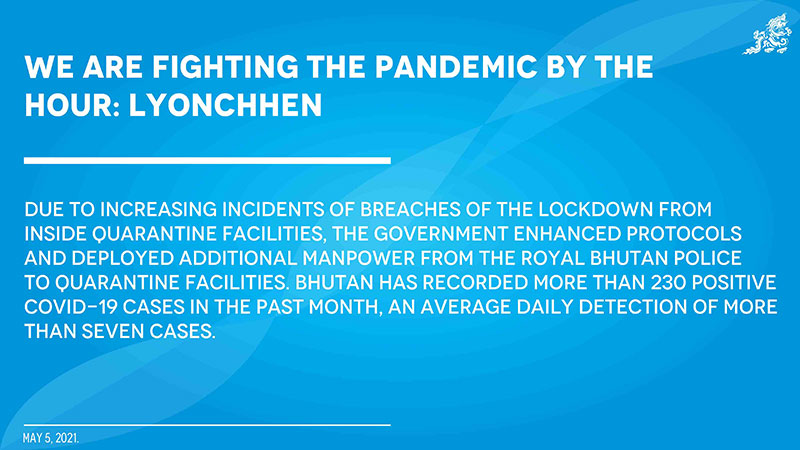…Govt. enhances the quarantine protocols in the wake of several breaches
Younten Tshedup
Bhutan has recorded more than 230 positive Covid-19 cases in the past month, an average daily detection of more than seven cases.
While the numbers, for now, may not be so alarming, experts warn that if the increase in cases continues for a longer duration, the health system would come under pressure.
“Bhutan cannot afford to let things become like in India. Even if a fraction of their (India) cases are reported here, we will be in serious trouble,” said a senior doctor with the national referral hospital.
He said that His Majesty The King’s concern — hospitals and crematoriums running out of spaces for patients and bodies — has become a reality in the neighbouring countries. “A similar situation could happen here as well if we are not careful.”
A major concern, he said, was with the daily cases being detected from the bordering areas including positives from the community in Phuentsholing. “These are the cases that are coming from India. The virus this time might as well be the dreaded new variant which is said to be more transmissible and lethal.”
Besides the growing number of positive cases in the country, there are also increasing incidents of breaches of lockdown and from inside the quarantine facilities. “Given the complacency that has set in, one mistake on our part could trigger a major disaster for all of us,” said the doctor.
The government has revised the quarantine protocol in the wake of such breaches.
Sowai Lyonpo (health minister) Dechen Wangmo said that as the country was almost a year and a half into the pandemic, complacency and pandemic fatigue was setting in.
“Despite having stringent protocols in place, it is only human to give in to the fatigue.
However, we are thoroughly reviewing and re-examining the protocols and SOPs and also enhancing the surveillance and monitoring systems in the quarantine centres.”
Lyonpo said that a national inspection and monitoring team was also formed to continuously provide oversight and monitor the protocols so that it was implemented diligently. Similar teams were also being formed in the dzongkhags.
Prime Minister Dr Lotay Tshering said that additional manpower from the Royal Bhutan Police was also deployed at the quarantine centres to strengthen the surveillance system.
Lyonchhen said that the double layer of surveillance made up of police and desuups was necessary to rule out any possibilities of human error following the recent incidents.
However, he said besides the two managers of the quarantine centres (hotels) who had deliberately breached the protocols, other frontline workers including desuups testing positive in the line of duty, should not be classified under breach.
Lyonchhen said that desuups, who have volunteered to serve during such a crisis, are engaged round the clock in catering to the residents in quarantine. “Every day they get multiple calls from the residents complaining of one or the other thing,” he said. “Despite putting on the protective gear, they have to walk into rooms of people who later turned positive, just to do their job.”
The prime minister added that although it was difficult to establish how a frontline worker from such facilities tested positive, it was understood that catering to and having some sort of interaction with the people in the quarantine could be the likely source of infection.
“Now grilling the desuup just to trace the source of infection is wrong, I think. They have risked their lives by volunteering to be in that facility. However, we ask all the questions that are supposed to be asked as per our existing protocol,” said Lyonchhen, adding that the government was fighting the pandemic by the hour.
According to a recent notification from the national task force, all government and private agencies are advised not to organise any meetings, conferences or workshops unless approved by the head of the agency. In the event of a transmission of the virus from such activities, the organisers would be held accountable.
Also, any individual found violating Covid-19 norms would be prosecuted in the Court of Law, irrespective of the persons professional background, stated the notification.
Meanwhile, on the new variants, Sowai Lyonpo said that like in the previous two outbreaks, samples were collected and sent to the World Health Organisation’s reference laboratory in Thailand for gene sequencing. “As of now, there are five variants of concern which we are closely monitoring.”
According to scientists, there were three variants, which are of public health concern for now are the UK (B.1.1.7), South African (B.1.351), and the Brazilian (B.P) variants of the SARS-CoV-2 virus.
However, health officials said that there are over 200 variants of the virus circulating today since the virus’s genome was first sequenced in China last year.
Bhutan too recorded some seven different variants of the virus during the last two outbreaks. None of them was of public health concern.


